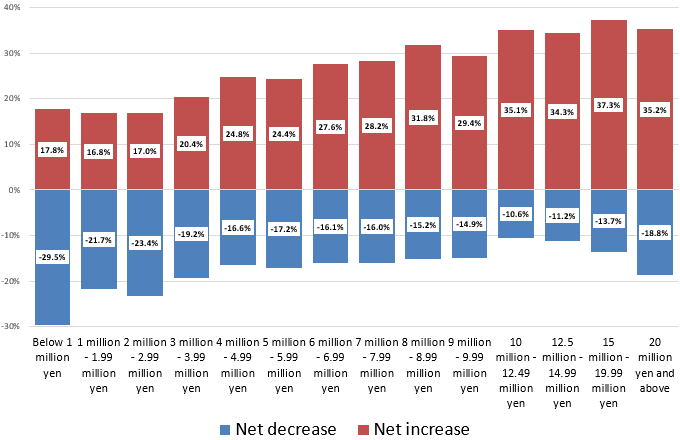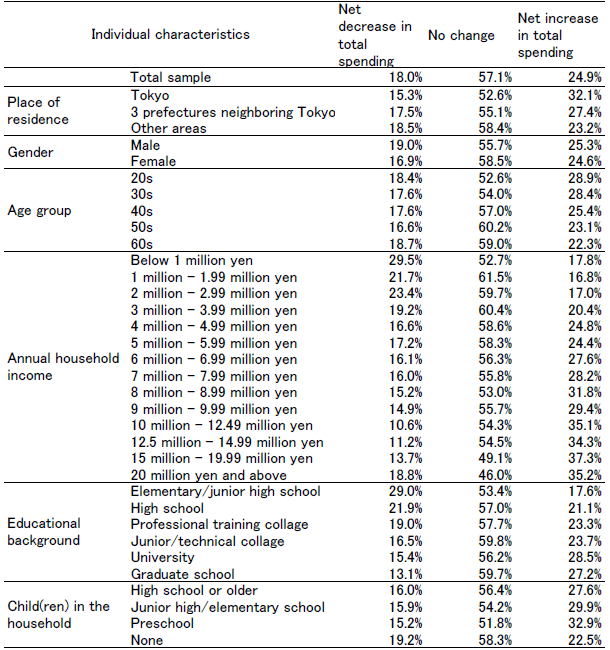We have only three years to go before the start of the 2020 Tokyo Olympics and Paralympics. Since the selection of Tokyo as the host city for the 2020 Summer Games, a series of agencies have released their estimates on the economic impact of the event. In what follows, I would like to shed light on some observed facts concerning points not fully taken into consideration in making such estimates. Specifically, I will focus on the following two factors: 1) the magnitude of the substitution effect, in which an increase in consumer spending induced by the Olympics and Paralympics will reduce consumer spending in other areas, and 2) the characteristics of consumers who are likely to increase consumption in net terms.
Macroeconomic impact of the Tokyo Olympics and Paralympics
Both Mizuho Research Institute (2014) and the Tokyo Metropolitan Government's Bureau of Olympic and Paralympic Games Tokyo 2020 Preparation (2017) estimate that the macroeconomic impact of hosting the Olympics and Paralympics will exceed 30 trillion yen in cumulative terms (Note 1). Their estimates include various factors ranging from an increase in construction investment prior to the event and an increase in consumer spending during the event to legacy effects and inter-industry spillover effects through input-output linkages.
There are many pieces of evidence concerning the economic impact of hosting the Olympics, which have been drawn from empirical studies on past host cities such as Athens, Beijing, and London. Baade and Matheson (2016) examined the costs and benefits of hosting Olympics based on a comprehensive survey of past host cities. They showed that post-event scrutiny tends to find smaller benefits compared to pre-event estimates, citing the tendency of pre-event studies to ignore the substitution effect in estimating economic impacts as one factor behind this. In other words, Olympics-related spending—such as ticket purchases and transportation—comes often at the cost of cutting spending in other areas, thereby partially offsetting the consumption-boosting effect of the event. Likewise, they noted that the actual number of inbound tourists often falls below the predicted number because of the crowding out effect, in which an increase in event-related inbound tourists discourages non-event-related tourists from visiting the city or region hosting the event.
In calculating the aforementioned 30 trillion yen plus economic impact, both Mizuho Research Institute and the Tokyo Metropolitan Government estimated that Olympics-related consumer spending—i.e. the sum of spending by participants and spectators during the Olympics and Paralympics and local household spending on related goods and services—would total several hundred billions of yen. However, they both noted that their estimates are in gross terms, which do not account for the substitution effect or any other negative factors. This probably reflects the fact that the substitution effect is difficult to estimate even though the possibility of such substitution is recognized. Indeed, some people may spend less, glued to the tube watching the events (Note 2).
Substitution relationship with consumer spending in other areas
In conjunction with this observation, I conducted a survey of 10,000 consumers across Japan to examine the net impact of hosting the 2020 Tokyo Olympics and Paralympics on consumer spending (Note 3). What follows is an outline of the survey results. First, in response to the question asking whether they would like to watch the forthcoming Olympics and Paralympics in person by purchasing a ticket, 13.8% of the respondents chose "Yes, definitely" and 31.2% "Yes, if possible." The proportions are higher among those living in Tokyo at 25.0% and 31.8% respectively. However, even among those living outside the greater Tokyo area, more than 40% chose either of the two answers. Thus, Tokyo will likely receive a multitude of domestic visitors from rural areas during the Olympics and Paralympics.
Concerning consumption expenditures, the questionnaire asked the following question: "What do you think will happen to your consumption expenditures (including ticket purchases) during the 2020 Tokyo Olympics and Paralympics?" Respondents were asked to choose from the following three answer options: 1) "Consumption expenditures will increase due to purchases of Olympic tickets and other related goods, the cost of travelling to watch games in person, etc.," 2) "Consumption expenditures, including those not related to Olympics, will remain unchanged," and 3) "Consumption expenditures will decrease due to spending more time watching the events on TV or the Internet instead of going out."
The results are as follows: 1) 24.9%, 2) 57.1%, and 3) 18.0%. The majority of the sample expect no significant change in their consumption expenditures, and a non-negligible number of people anticipate a decrease in their consumption expenditures as they expect to spend more time watching the events on TV (Note 4). However, the percentage of those expecting a net increase in consumption expenditures is somewhat higher than that of those anticipating a net decrease, and those with higher income show a greater tendency to expect a net increase in consumption expenditures as will be discussed later. Given these observations, it is fair to say that consumer spending in Japan will likely increase in net terms during the Olympics and Paralympics. At the same time, the survey results also suggest that the substitution effect is too large to ignore in estimating the economic impact of hosting the Olympics and Paralympics.
Who are expecting a net increase in their consumption expenditures?
Who are expecting a net increase or a net decrease in their consumption expenditures? Let's take a look at the survey results cross-tabulated by individual characteristics, such as area of residence, age group, and household income (Table 1). Not surprisingly, Tokyo has the highest percentage of those expecting a net increase, followed by three prefectures neighboring Tokyo. While there is no significant difference between men and women, those in their 20s and 30s are more likely to increase their consumption expenditures than those in other age groups.
Interestingly, the higher the household income, the greater is the likelihood to increase their consumption expenditures in net terms with the percentage of those expecting a net increase significantly high among those with an annual household income of 10 million yen or more. In contrast, the percentage of those expecting a net decrease exceeds that of those expecting a net increase among those with an annual household income of less than three million yen (Figure 1). The percentage of those expecting a net increase is relatively high among those with a college or higher degree, and that of those expecting a net decrease among those with high school or lower education. In addition, those living with their child(ren)—particularly, preschool-aged one(s)—show a strong interest in watching the events in person and tend to expect a net increase in their consumption expenditures.

These results reflect the influence of various individual characteristics of respondents. For instance, one may argue that the higher percentage of those expecting a net income observed among highly educated people is partly attributable to the following two factors: 1) younger generations tend to have higher educational attainment, and 2) those with higher educational attainment tend to have a higher annual income. However, even after controlling for the influence of all of the individual characteristics, those in their 20s and 30s, high-income earners, those with higher educational attainment, and households with at least one preschool child tend to have strong interest in watching the forthcoming Olympics and Paralympics in person and expect a net increase in their consumption expenditures (Note 5).
In estimating the demand-boosting effect of a large-scale event, including but not limited to the Olympics, we tend to focus on gross increases in demand. In reality, however, a significant portion of event-related consumption comes at the cost of reducing spending in other areas. Thus, we need to make a conservative estimate for the net effect. Putting a positive spin on the above survey results, we may not have to worry too much about a post-Olympics downturn, at least as far as consumption is concerned. However, as aforementioned, we need to pay attention to the heterogeneity of individuals behind the numbers aggregated at the macroeconomic level.
The analysis above is based on the results of a pre-event survey in which respondents were asked to provide their subjective expectations, and actual consumption behavior during the Olympics and Paralympics may turn out to be quite different depending on various factors such as the economic and weather conditions at the time and the performance of Japanese athletes. It is thus important to conduct a post-event review, using statistical data such as those from the Family Income and Expenditure Survey. Also, it should be noted that the discussion in this article is limited to observations concerning consumption during the Tokyo Olympics and Paralympics, and various other economic effects—such as construction investment prior to the event and legacy effects following the event—are outside the scope. The leveling of demand is extremely important for the performance of service industries, particularly restaurants and hospitality businesses (Morikawa 2016). How long the positive legacy effects of the Tokyo Olympics and Paralympics will last following the peak demand during the event will have a significant impact on the Japanese economy from 2020 onward.



